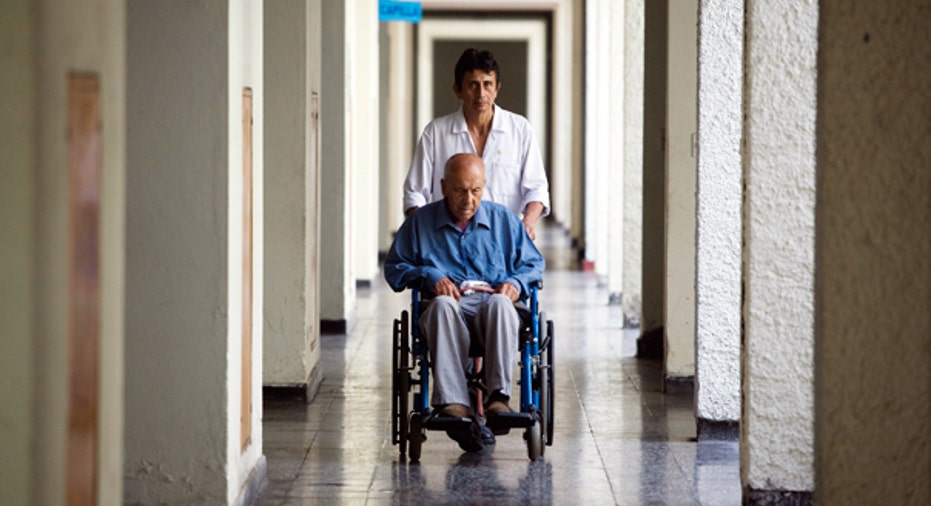Are You Responsible for Mom's Nursing Home Bill?

As your parents age, they may spend a few months or more in a long-term care facility. Thanks to parental support laws, also known as "filial support," you could be on the hook for unpaid bills they leave behind.
These laws allow long-term care providers to pursue payment from a parent's adult children in 29 states and Puerto Rico.
A recent study published by Katherine Pearson, a professor of law at the Dickinson School of Law at Penn State University, found that long-term care providers are taking advantage of such laws in at least two states: Pennsylvania and South Dakota.
So far, however, such actions remain unusual throughout the country, says Howard Krooks, president-elect of the National Academy of Elder Law Attorneys, or NAELA, and an attorney with Elder Law Associates PA in Boca Raton, Fla.
"Filial responsibility laws traditionally have rarely been enforced," he says.
A Case Study
Nevertheless, Pearson recounts a cautionary tale about a high-profile case in Pennsylvania involving expenses incurred by Maryann Pittas, the victim of a car accident. Pittas was a patient in an Allentown, Pa., nursing home for about six months before relocating to Greece to live with relatives. Pittas' son got stuck with the bill for nearly $93,000.
After the case wound its way through the court system, in May 2012, the superior court found in favor of the nursing home, based on the son's ability to pay.
"By holding the son liable for a lump sum of close to $93,000 in the Pittas case, the superior court appears to confirm a significant tool for certain creditors of individuals who are unable to pay their debts personally, permitting the filial support statute to be applied retroactively to substantial accrued debt, without requiring evidence of fault on the part of the targeted family member," according to Pearson's study.
History of Parental Support Laws
Parental support laws date back to colonial times and even earlier, according to Pearson's research. Such laws were established to make sure family members relied on one another rather than turning to public resources for help.
At one time, as many as 45 states had these laws, but many states repealed them as Medicaid began to take on a greater role in providing relief to the poor. However, such laws remain on the books in many states.
Laws in such states vary. Some examples of differences include the following.
- Arkansas: Support requirement is limited to a parent's mental health services.
- Connecticut: The law limits a child's legal obligation to support of parents younger than 65.
- Nevada: Children are not bound to support parents unless they've made a written promise to do so.
The large cohort of aging baby boomers -- coupled with increased life expectancies -- threatens a surge in the use of costly long-term care services.
At the same time, new restrictions have been placed on Medicaid, which traditionally has paid a large percentage of long-term care costs in the United States. For example, the Deficit Reduction Act of 2005 increases penalties on people who transfer assets for less than market value prior to applying for Medicaid.
All of these circumstances have combined to cause some creditors to turn to parental support laws as a means of collecting debt, according to Pearson's report.
Still, Krooks says it is a mistake to suggest that the practice is widespread. He says that after passage of the Deficit Reduction Act, it was expected that increasing numbers of nursing homes would turn to filial responsibility laws to pursue payment in cases where Medicaid is denied.
"That did not happen, however," he says.
Avoiding Parental Support Pitfalls
Medicare may cover nursing home care if certain conditions are met, but only for a maximum of 100 days, says Marielle Hazen, a NAELA member and elder law attorney with Hazen Elder Law in Harrisburg, Pa.
At that point, residents without long-term care insurance must pay for their own care until private resources are depleted to the point where they are eligible for Medicaid.
"When nursing homes sue family members, it is usually because there is a gap in coverage between private pay and Medicaid eligibility," Hazen says.
How can you make sure you do not fall victim to a parental support action?
Harold Grodberg, a NAELA member and elder law attorney with the Grodberg Law Firm LLC in Clark, N.J., urges families to avoid that situation by planning ahead.
"Children have to be proactive regarding how their parents are financing their long-term care," he says.
Some families of modest means may assume Medicaid will cover a parent's care once the parent has depleted savings and other resources. But Grodberg says it is a mistake to assume that Medicaid will be easy to obtain.
"Medicaid laws are convoluted and often counterintuitive," he says. "I often tell clients if they try and use common sense in the Medicaid application process, they will make a mistake."
Instead of doing "Medicaid planning at home," he urges children and parents to get the help of an elder law professional "when the parent enters the nursing facility, not when they are about to run out of money."
Krooks urges children and parents to discuss buying long-term care insurance. He says the nursing home in the Pittas case might have been less likely to pursue the parental support course of action if it had received at least partial payment while waiting on Medicaid for the remaining money.
He also agrees with Grodberg that it is important to get professional help, especially if you are depending on Medicaid.
"Make sure that all financial ducks are aligned, and file the application quickly so that from a cash-flow perspective, the nursing home is not being asked to wait an excessively long time to receive payment for services," he says.
Copyright 2012, Bankrate Inc.



















